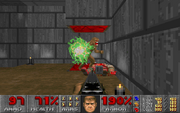No edit summary |
(Added an example of how teleporters do not need particular textures and are direction-sensitive.) |
||
| Line 26: | Line 26: | ||
Teleporter linedefs are direction-sensitive. This is necessary for cases where the landing area is another teleporter, so that the player can walk off the landing spot without teleporting again. |
Teleporter linedefs are direction-sensitive. This is necessary for cases where the landing area is another teleporter, so that the player can walk off the landing spot without teleporting again. |
||
| − | Conventionally, a teleporter is constructed as a 64-[[Map unit|unit]] square with a distinctive [[flat|floor texture]]; however, this is not a technical requirement. All sides of a teleporter usually teleport to the same place, but again this is not required: some levels attempt to confuse the player by sending him/her to different places depending on which side the teleporter is entered from. |
+ | Conventionally, a teleporter is constructed as a 64-[[Map unit|unit]] square with a distinctive [[flat|floor texture]]; however, this is not a technical requirement. All sides of a teleporter usually teleport to the same place, but again this is not required: some levels attempt to confuse the player by sending him/her to different places depending on which side the teleporter is entered from. An example of both of these instances can be seen in [[MAP18: The Courtyard (Doom II)|MAP18: The Courtyard]] in [[Doom II]], where the player is teleported without warning when entering a particular room but is not teleported when leaving that room. |
Teleporters figure prominently in Doom's background story: it was an unexpected side effect of [[UAC]]'s experiments with teleportation that opened the gates of [[Hell]]. |
Teleporters figure prominently in Doom's background story: it was an unexpected side effect of [[UAC]]'s experiments with teleportation that opened the gates of [[Hell]]. |
||
Revision as of 23:24, 6 August 2011
| Teleport landing data | |
|---|---|
| Thing type | 14 (decimal), E (hex) |
| Appears in | Shareware Doom Registered Doom Ultimate Doom Doom II/Final Doom |
| Radius | 20 units |
| Sprite | TFOG (only while in operation; also drawn at departure point) |
| Class | none |

A teleporter in use on E2M1: Deimos Anomaly
A teleporter moves players and monsters from one location on the map to another, almost instantly, with a flash of green fog and a whoosh noise (DSTELEPT).
In vanilla Doom, there are four linedef types for teleporting. These implement the combinations of one-time versus repeating and players or monsters versus monsters only. All of them are of the walk-over variety.
The linedef's tag specifies the destination sector (the lowest-numbered sector with the same tag value). Within that sector, there must be a teleport landing Thing, which specifies the coordinates and angle the player or monster will have after teleporting. Barrels will also teleport if they cross a teleport linedef while being shot at.
If a monster or player is on the landing spot at the time of teleporting, monsters will not teleport but players will, killing whatever was on the landing spot. This is known as a telefrag. A player will self-telefrag if a voodoo doll is on the landing spot. In vanilla implementations, moreover, monsters can telefrag each other or the player on MAP30 of any WAD (some source ports allow the player to disable this exception or apply it to every map).
Teleporter linedefs are direction-sensitive. This is necessary for cases where the landing area is another teleporter, so that the player can walk off the landing spot without teleporting again.
Conventionally, a teleporter is constructed as a 64-unit square with a distinctive floor texture; however, this is not a technical requirement. All sides of a teleporter usually teleport to the same place, but again this is not required: some levels attempt to confuse the player by sending him/her to different places depending on which side the teleporter is entered from. An example of both of these instances can be seen in MAP18: The Courtyard in Doom II, where the player is teleported without warning when entering a particular room but is not teleported when leaving that room.
Teleporters figure prominently in Doom's background story: it was an unexpected side effect of UAC's experiments with teleportation that opened the gates of Hell.
Boom introduced some extended teleporter line types, including switch-activated teleporters and silent teleporters. The latter preserve player orientation, position, momentum and height so that the teleport may not be noticed; this can be used to simulate rooms over rooms and for other special effects.
